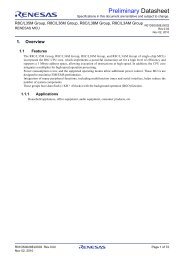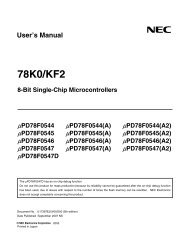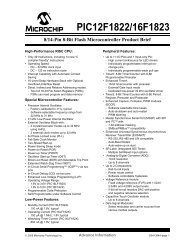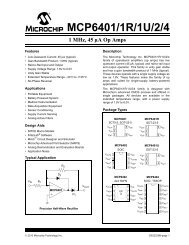xmega a3u - Elfa
xmega a3u - Elfa
xmega a3u - Elfa
Create successful ePaper yourself
Turn your PDF publications into a flip-book with our unique Google optimized e-Paper software.
XMEGA A3U<br />
21. USB – Universal Serial Bus Interface<br />
21.1 Features<br />
• One USB 2.0 full speed (12Mbps) and low speed (1.5Mbps) device compliant interface<br />
• Integrated on-chip USB transceiver, no external components needed<br />
• 16 endpoint addresses with full endpoint flexibility for up to 31 endpoints<br />
– One input endpoint per endpoint address<br />
– One output endpoint per endpoint address<br />
• Endpoint address transfer type selectable to<br />
– Control transfers<br />
– Interrupt transfers<br />
– Bulk transfers<br />
– Isochronous transfers<br />
• Configurable data payload size per endpoint, up to 1023 bytes<br />
• Endpoint configuration and data buffers located in internal SRAM<br />
– Configurable location for endpoint configuration data<br />
– Configurable location for each endpoint's data buffer<br />
• Built-in direct memory access (DMA) to internal SRAM for:<br />
– Endpoint configurations<br />
– Reading and writing endpoint data<br />
• Ping-pong operation for higher throughput and double buffered operation<br />
– Input and output endpoint data buffers used in a single direction<br />
– CPU/DMA controller can update data buffer during transfer<br />
• Multipacket transfer for reduced interrupt load and software intervention<br />
– Data payload exceeding maximum packet size is transferred in one continuous transfer<br />
– No interrupts or software interaction on packet transaction level<br />
• Transaction complete FIFO for workflow management when using multiple endpoints<br />
– Tracks all completed transactions in a first-come, first-served work queue<br />
• Clock selection independent of system clock source and selection<br />
• Minimum 1.5MHz CPU clock required for low speed USB operation<br />
• Minimum 12MHz CPU clock required for full speed operation<br />
• Connection to event system<br />
• On chip debug possibilities during USB transactions<br />
21.2 Overview<br />
The USB module is a USB 2.0 full speed (12Mbps) and low speed (1.5Mbps) device compliant<br />
interface.<br />
The USB supports 16 endpoint addresses. All endpoint addresses have one input and one output<br />
endpoint, for a total of 31 configurable endpoints and one control endpoint. Each endpoint<br />
address is fully configurable and can be configured for any of the four transfer types; control,<br />
interrupt, bulk, or isochronous. The data payload size is also selectable, and it supports data<br />
payloads up to 1023 bytes.<br />
No dedicated memory is allocated for or included in the USB module. Internal SRAM is used to<br />
keep the configuration for each endpoint address and the data buffer for each endpoint. The<br />
memory locations used for endpoint configurations and data buffers are fully configurable. The<br />
amount of memory allocated is fully dynamic, according to the number of endpoints in use and<br />
8386B–AVR–12/11<br />
40
















